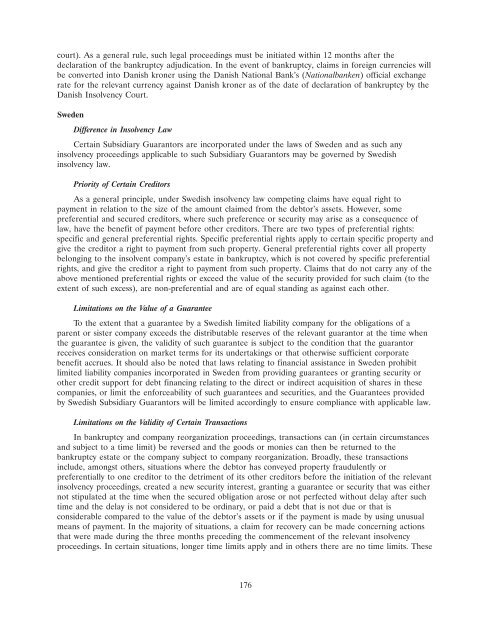Ardagh Glass Finance plc - Irish Stock Exchange
Ardagh Glass Finance plc - Irish Stock Exchange
Ardagh Glass Finance plc - Irish Stock Exchange
Create successful ePaper yourself
Turn your PDF publications into a flip-book with our unique Google optimized e-Paper software.
court). As a general rule, such legal proceedings must be initiated within 12 months after the<br />
declaration of the bankruptcy adjudication. In the event of bankruptcy, claims in foreign currencies will<br />
be converted into Danish kroner using the Danish National Bank’s (Nationalbanken) official exchange<br />
rate for the relevant currency against Danish kroner as of the date of declaration of bankruptcy by the<br />
Danish Insolvency Court.<br />
Sweden<br />
Difference in Insolvency Law<br />
Certain Subsidiary Guarantors are incorporated under the laws of Sweden and as such any<br />
insolvency proceedings applicable to such Subsidiary Guarantors may be governed by Swedish<br />
insolvency law.<br />
Priority of Certain Creditors<br />
As a general principle, under Swedish insolvency law competing claims have equal right to<br />
payment in relation to the size of the amount claimed from the debtor’s assets. However, some<br />
preferential and secured creditors, where such preference or security may arise as a consequence of<br />
law, have the benefit of payment before other creditors. There are two types of preferential rights:<br />
specific and general preferential rights. Specific preferential rights apply to certain specific property and<br />
give the creditor a right to payment from such property. General preferential rights cover all property<br />
belonging to the insolvent company’s estate in bankruptcy, which is not covered by specific preferential<br />
rights, and give the creditor a right to payment from such property. Claims that do not carry any of the<br />
above mentioned preferential rights or exceed the value of the security provided for such claim (to the<br />
extent of such excess), are non-preferential and are of equal standing as against each other.<br />
Limitations on the Value of a Guarantee<br />
To the extent that a guarantee by a Swedish limited liability company for the obligations of a<br />
parent or sister company exceeds the distributable reserves of the relevant guarantor at the time when<br />
the guarantee is given, the validity of such guarantee is subject to the condition that the guarantor<br />
receives consideration on market terms for its undertakings or that otherwise sufficient corporate<br />
benefit accrues. It should also be noted that laws relating to financial assistance in Sweden prohibit<br />
limited liability companies incorporated in Sweden from providing guarantees or granting security or<br />
other credit support for debt financing relating to the direct or indirect acquisition of shares in these<br />
companies, or limit the enforceability of such guarantees and securities, and the Guarantees provided<br />
by Swedish Subsidiary Guarantors will be limited accordingly to ensure compliance with applicable law.<br />
Limitations on the Validity of Certain Transactions<br />
In bankruptcy and company reorganization proceedings, transactions can (in certain circumstances<br />
and subject to a time limit) be reversed and the goods or monies can then be returned to the<br />
bankruptcy estate or the company subject to company reorganization. Broadly, these transactions<br />
include, amongst others, situations where the debtor has conveyed property fraudulently or<br />
preferentially to one creditor to the detriment of its other creditors before the initiation of the relevant<br />
insolvency proceedings, created a new security interest, granting a guarantee or security that was either<br />
not stipulated at the time when the secured obligation arose or not perfected without delay after such<br />
time and the delay is not considered to be ordinary, or paid a debt that is not due or that is<br />
considerable compared to the value of the debtor’s assets or if the payment is made by using unusual<br />
means of payment. In the majority of situations, a claim for recovery can be made concerning actions<br />
that were made during the three months preceding the commencement of the relevant insolvency<br />
proceedings. In certain situations, longer time limits apply and in others there are no time limits. These<br />
176
















